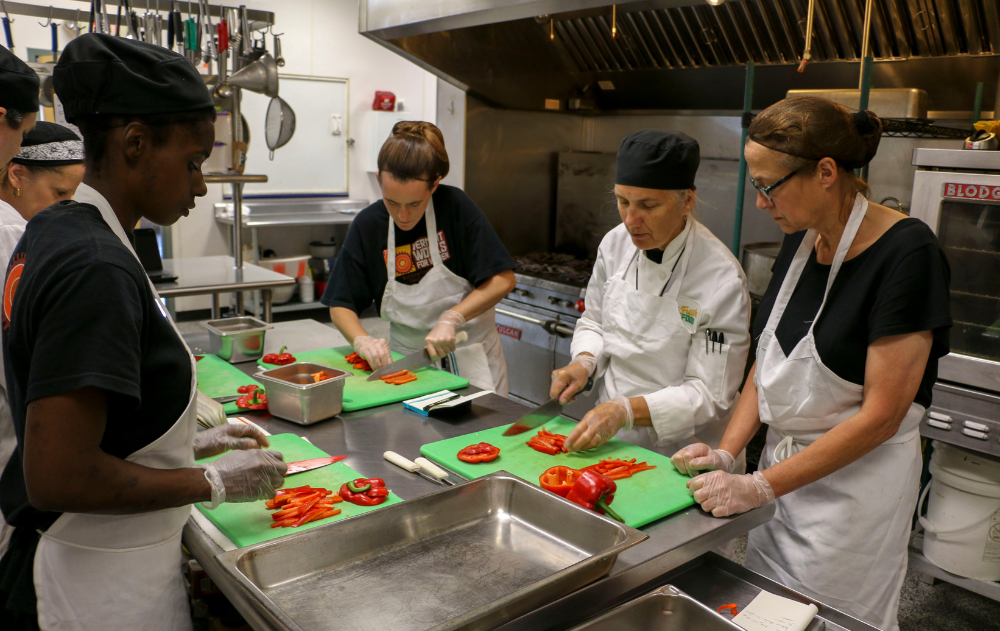New Culinary Program at Vermont Women’s Correctional Facility

By Heather Newcomb, VWW Program Manager for Justice-Involved Services
Program Overview
On September 27, Vermont Works for Women started a new program at Chittenden Regional Correctional Facility (CRCF), training incarcerated women in culinary skills, combining hands-on skills with classroom curriculum. During the new 12-week pilot course, trainees will focus on basic skills in institutional-style cooking, preparing them to work in health centers, college campuses, and other high-volume cafeterias after release.
The first of three cohorts consists of 4 trainees who currently work in the kitchen and stay past their shift to work with Chef Instructor, Sarah Anderson. Sarah is a trained Chef and former Chef and owner of restaurant and catering businesses. She currently works at Ferrisburgh Central School.
Program participants will spend most of their time on knife handling to build mastery in different types of cuts, proper care, and maintenance as well as types of knives and their uses. Additionally, trainees will learn kitchen math, reading recipes, menu development, and food safety. Graduates of the program will be able to use their newfound kitchen skills and confidence to set themselves up for success in the community.
Why is Programming Important?
According to the Sentencing Project, only 1/2 of women in prison participate in educational or vocational programming; 1 in 5 takes high school or GED classes, and less than 1 in 3 participates in a vocational program. Vermont Works for Women’s new 1-year pilot is the only on-site job-training program in the Vermont Women’s Correctional Facility.
Employment is one of the biggest factors impacting formerly incarcerated individuals’ successful re-entry to society. Steady employment ensures that people can meet the needs of their families, have access to housing, and reduce the chance of returning to incarceration. It is our hope that by participating in this program, graduates will be a step ahead in the employment process post-release.
The Prison Policy Institute found that the unemployment rate for formerly incarcerated people is nearly five times higher than the unemployment rate for the general United States population and substantially higher than even the worst years of the Great Depression.
Our new training program will help women overcome some of the structural barriers to securing employment. The women are very excited to participate in this new program. They are eager to gain the skills to work in the culinary industry and expand their employment opportunities following their release.
VWW is looking forward to expanding training opportunities for the women at CRCF, and collaborated with many people to make this pilot possible. We are incredibly grateful for Howard Fisher, a retired professor from the New England Culinary Institute who for three years provided design, advice, and promotion of the pilot. We are also working very closely with Chef Bryan Mitofsky, Facility Food Service Manager at CRCF to coordinate this program and develop the training manual our trainees will follow.

It is touching to see all the interest and words of support for our new pilot’s success. We are pleased by the vast interest in the program from the Vermont “foodie” community and appreciate Melissa Pasanen, Food Writer for Seven Days for her article.
Open Hiring
In addition to our efforts inside the Vermont Women’s Correctional Facility, VWW is working in the community to educate employers about inclusive business practices. We recently joined Vermont Businesses for Social Responsibility (VBSR) for a virtual workshop series to discuss open hiring. Open hiring presents the opportunity for employment to anyone that can meet basic expectations. It benefits both the employer and individuals who have difficulty finding and keeping work due to barriers, such as criminal history, limited education, or lack of work experience.
Employers find that open hiring provides access to a larger candidate pool, decreases onboarding costs, and improves employee retention. Potential employees are accepted at the present moment rather than having judgments and assumptions made based on their past experiences. As a result of open employment many formerly incarcerated individuals have been given an equal opportunity to apply for and acquire jobs that contribute to their successful reentry into the community.